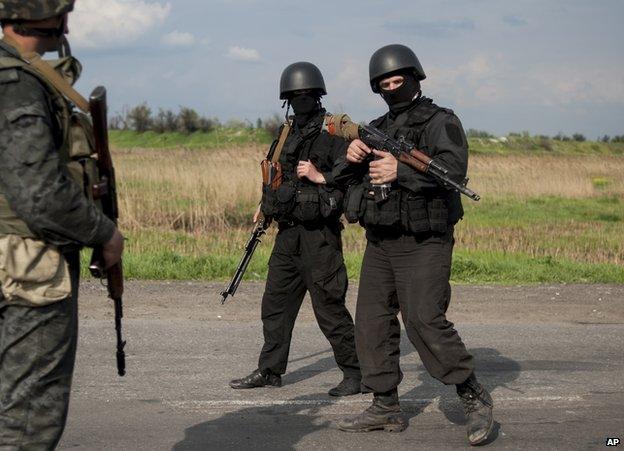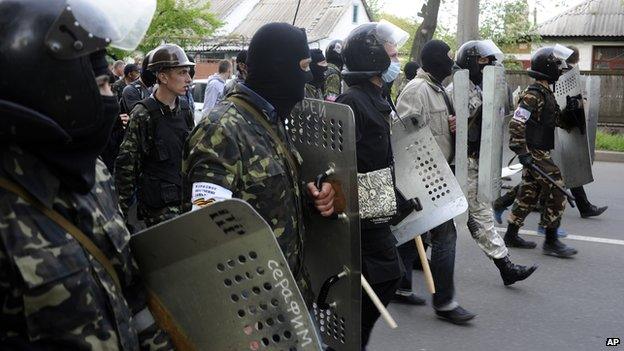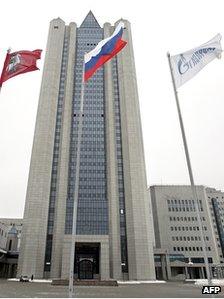Ukraine and Europe's Sleepwalkers
- Published
- comments

Sloviansk: The Ukrainian national guard is trying to rein in pro-Russian separatists
In Europe it is a time of remembering. In Russia, 9 May marks the anniversary of the defeat of the Nazis. Elsewhere it is marked as Europe Day.
Later this summer Europe's leaders will stand together to recall the 100th anniversary of the outbreak of World War One. It is 75 years since the start of World War Two.
Until recently Europeans assumed the weight of its history had lifted, that new alliances and institutions had made war impossible. It assumed that borders would never again be altered by force.
Russia had been brought in from the cold. It became an important trading partner for Europe. It occupied a seat at the global economy's top table, the G20. Europe scaled back its defence spending, believing it inhabited a benign neighbourhood.
Careless of history, it foresaw the European Union's expansion east almost as a technical exercise.
And then came Ukraine and, with the deployment of the Russian military, many of the assumptions of the past 20 years are being discarded.
Europe's leaders, however, still struggle to accept the new reality. They act as if the dream will pass and their familiar world will return. It is why commentators have cited the book The Sleepwalkers,, external which charted how Europe stumbled into World War One.
Where's the strategy?
Gradually Europe's leaders have realised what is at stake. "If the wrong decisions are made now," says the German Foreign Minister Frank-Walter Steinmeier, "they could nullify decades of work, threatening the freedom and security of Europe".
And yet Europe's leaders have failed to influence the crisis. They are reactors to events, not shapers. Not once have they acted in a way that would give Russia's President Putin pause for thought. Every step they have taken towards freezing assets or banning visas has been agonising and unconvincing.
So in a relatively short space of time eastern and southern Ukraine has been destabilised. Ukraine no longer functions as a state in charge of its own territory.

Pro-Russian separatists in the Donetsk region have defied Kiev by seizing key buildings
The Kremlin's strategy has been to make the scheduled Ukrainian presidential elections on 25 May meaningless. Vladimir Putin's spokesman said it would be "absurd" to proceed with the polls.
The operation to seize and occupy Ukrainian government buildings has been orchestrated. Certainly the view in Washington and most of Europe is that these events have been carefully calibrated by Russia.
Europe's much-repeated threat of "serious consequences" has had no impact on the ground.
The Geneva accords were still-born. Moscow never called for pro-Russian protesters to evacuate buildings in the east and to start talking with Kiev. Protesters remained in Independence Square (the Maidan) in the capital Kiev.
Economic imperatives
Europe only had one card to influence events and that was far-reaching economic sanctions.

Russian energy giant Gazprom is a key gas supplier for Germany
Germany's business lobby has essentially blocked that. More than 6,000 German companies do business in Russia and have argued fiercely against tougher sanctions. They want the business world to continue unruffled by events in Ukraine.
The chief executive of Siemens visited President Putin and spoke of "temporary turbulence". The former German Chancellor Gerhard Schroeder - and currently on the Gazprom board - saw no reason to forego a public embrace with Putin on his 70th birthday.
Other countries like Spain and Italy, struggling to escape the legacy of the eurozone crisis, show no appetite for meaningful sanctions.
Which brings us back to history. Events develop their own momentum. They do not necessarily reward sitting on the sidelines. One round of killings prompts revenge. Ordinary people are drawn to the extremes. Neighbours who only a few weeks ago lived peacefully together now take up nationalistic slogans.
In Syria the protests against the Assad regime very rapidly were taken over by more extreme groups, after regime forces opened fire at pro-democracy demonstrators.
In the Balkans, too, inaction led to the conflict spreading and massacres followed.
The Polish Prime Minister Donald Tusk has warned that, in the worst case, Ukraine will descend into civil war with refugees fleeing into neighbouring countries. The history of other conflicts suggests that outside countries would be drawn into the conflict and Europe could hardly sit on its hands in the face of a refugee crisis.
Germany remains the key. It is putting all its diplomatic muscle into arranging another international conference to try and negotiate a breakthrough, but the crisis is increasingly being driven by events on the ground. German business continues to argue for its interests, but Ulrich Speck, writing in Die Zeit, , externalsaid "the attack on Ukraine is an attack on the very order that underpins Germany's freedom, security and prosperity". The risk is a new war in Europe.